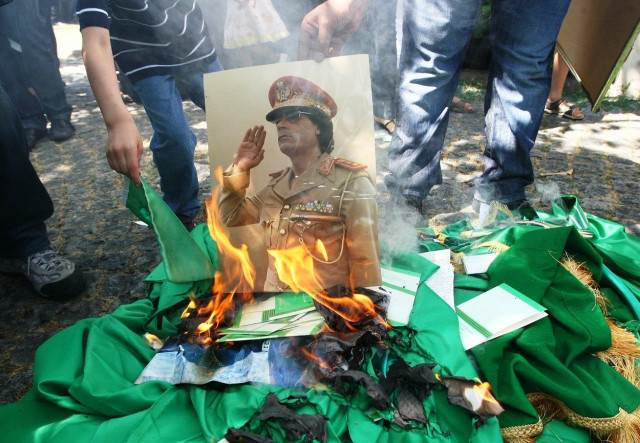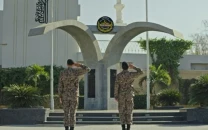Victory hands new set of problems to Libya rebels
Analysts say divisions among Qaddafi foes may still come to the fore.

It is not clear if they can achieve this, but the implosion of Muammar Qaddafi's authority in the capital – so far without a bloodbath – suggests its two million inhabitants are focused more on reconciliation than revenge.
The assault on Tripoli has been a stunning success. In many cases rebel fighters have simply walked into the capital without firing a shot. Much of that is due to a long-planned civilian revolt in parts of the capital that erupted on Saturday evening.
But the battle-hardened fighters flooding into Tripoli may eventually become a liability for opposition leaders who will now want to channel the emotional rush of revolution into the more pedestrian work of reconstruction, analysts say.
Restoring public order would be helped by a spirit of reconciliation, not only between former Qaddafi loyalists and opponents, but also between disparate rebel forces who may now compete, perhaps violently, for the spoils of victory.
Rebel unity "hard to predict"
Arab commentator Issandr El Amrani said it was unclear how much control the Benghazi-based National Transitional Council (NTC) "can really exert over what amounts to a large, diffuse coalition of anti-Qaddafi forces that – once the Brother Leader is killed, exiled or arrested – may have less common cause.
"There are a lot of light weapons in the hands of volunteer fighters in Libya, and like in any conflict, it's hard to predict what they might end up doing with them in the coming transition," he wrote.
The omens are mixed.
A faltering performance by the NTC could hurt the chances of a peaceful transition in which to resolve big issues such as forging a new constitution, rebuilding the economy and deciding what to do with Qaddafi, if he is captured, and his sons.
The council seems to be scrambling to keep up with events.
Rifts may emerge
NTC officials had indicated they would disclose the names of the Tripoli-based officials in their leadership team at the right time – after keeping them secret until now for their own safety. But there was no word on this by mid-Monday.
However, TNC member Abdullah Gzema, said four council members had travelled to Tripoli to prepare for Qaddafi's downfall before rebel fighters closed in on the city.
He said rebel leaders wanted civilian authorities, not frontline fighters, to control security in Tripoli and elsewhere to prepare for Qaddafi's overthrow.
Another NTC member, Suleimanal Sahli, said there would be no wholesale purging of Qaddafi's administration and security forces, such as happened in Iraq after Saddam Hussein's fall.
"We will work with them, except for those who were very close to Qaddafi, but I think they have gone already," he said.
Nevertheless, rebel divisions may now come to the fore. George Joffe, a North Africa expert at Cambridge University, said the assault on Tripoli was led by rebels from Western Libya. "There is no guarantee they will accept the leadership of Benghazi. So we are entering a very dangerous phase."
Some see the swift fall of Tripoli as a hopeful omen for a relatively peaceful transition.
Parts of Qaddafi's security forces abandoned their posts, defected or stood aside as insurgents and their civilian supporters took over Tripoli districts at the weekend.
Noman Benotman, senior analyst at the Quilliam Foundation and an associate of Qaddafi's former spy chief Moussa Koussa, told Reuters the Tripoli uprising "was all made possible by the people of Tripoli themselves".
They had some help because some army and intelligence officers had ordered their men not to resist, he said, citing a military intelligence commander, elBarrani Ashkal, a cousin of Qaddafi's, who he said had told his men not to attack rebels.
"The implications of this for the transition are very good. It's the perfect scenario for the future, because there was no substantial fighting," Benotman said.
The coordinated nature of the revolt and joyous scenes that accompanied it shows that Qaddafi was widely loathed.
Hafedal Ghwell, a US-based Libyan opposition activist, said his family like those of many Libyans had suffered immensely from Qaddafi's despotism, but now was not the time to vent personal grievances, legitimate though they may be.
"Young battle-hardened fighters could take over by the gun and this is a real danger," he told Reuters.
"In post-conflict situations the most important thing is to focus people's energy on a political framework, rather than letting them fall into more primitive processes and habits," he said, advocating forgiveness and reconciliation.
Working class revolt
Juan Cole, history professor at the University of Michigan, blogged that Qaddafi had lost popular support across the board and was in power only through force.
"The secret of the uprising's final days of success lay in a popular revolt in the working-class districts of the capital, which did most of the hard work of throwing off the rule of secret police and military cliques," he wrote.
"Once enough of his heavy weapons capability was disrupted, and his fuel and ammunition supplies blocked, the underlying hostility of the common people to the regime could again manifest itself, as it had in February."
Cole cautioned against underestimating future challenges, such as mopping up Qaddafi loyalists, restoring law and order in rebel-held cities, reconstituting the police and the national army, moving the NTC to Tripoli, founding political parties and building a new, parliamentary regime.
"Even in much more institutionalised and less clan-based societies such as Tunisia and Egypt, these tasks have proved anything but easy," he wrote.
"But it would be wrong in this moment of triumph ... to dwell on the difficulties to come. Libyans deserve a moment of exultation."



















COMMENTS
Comments are moderated and generally will be posted if they are on-topic and not abusive.
For more information, please see our Comments FAQ